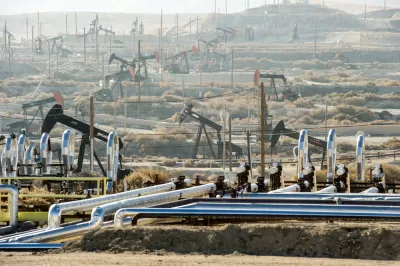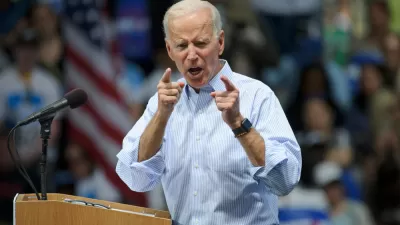A political action committee representing the energy industry, including fossil fuels, has been formed by two former U.S. senators, a Republican and Democrat, to advance a carbon fee-and-dividend plan on Capitol Hill.

"Former Sens. Trent Lott (R) of Mississippi and John Breaux (D) of Louisiana, longtime lobbyists and two of big oil’s most devoted servants, have formed Americans for Carbon Dividends (AFCD), a political action committee dedicated to the passage of a carbon tax," reports David Roberts, who writes on energy and climate change for Vox, on June 23.
AFCD is educating the public about, and lobbying for, a policy called carbon tax-and-dividend. More specifically, it is pushing a proposal that was released last year by a nonprofit called the Climate Leadership Council (CLC), led by former Secretary of State James A. Baker III. AFCD is effectively the lobbying arm of the CLC.
The tax, technically a carbon fee-and-dividend, is similar to the 2016 unsuccessful Washington state initiative in the sense this it is revenue neutral, with revenue being returned to residents, as opposed to being used to reduce greenhouse gas emissions, as California's cap-and-trade program does. See the four pillars of the carbon dividend plan.
A Planetizen post on the release of the proposal in February 2017 notes the trade-off of environmental regulations for the carbon fee:
"The Baker proposal would substitute the carbon tax for the Obama administration’s Clean Power Plan," according to John Schwartz [of The New York Times] in offering more details on the proposal. "At an initial price of $40 per ton of carbon dioxide produced, the tax would raise an estimated $200 billion to $300 billion a year, with the rate scheduled to rise over time."
"So far, funders include Exelon, the operator of America’s largest nuclear fleet, First Solar, and the American Wind Energy Association," adds Roberts. "Four big oil companies, Exxon Mobil, BP, Royal Dutch Shell, and Total SA supported the CLC proposal and are said to be mulling donations to AFCD."
While companies from the oil, gas, nuclear, and renewable sectors of the energy field have endorsed the effort, there is one conspicuous absence: coal.
Under any economy-wide carbon tax, it will be coal that’s hit first and hardest. And what’s bad for coal is good for natural gas, at least in the short-term.
While most climate hawks recognize the importance of placing a price on carbon emissions, two provisions in the CLC carbon fee-and-dividend proposal should give them some pause.
First, EPA regulations meant to reduce greenhouse gas emissions, like the Clean Power Plan, would be revoked, allegedly rendered unnecessary. (It’s unclear exactly which regulations are included.) And second, energy companies would be given immunity to climate-based lawsuits like several currently underway.
Reporter's assessment
Depending on the reader's perspective, David Roberts, who previously wrote for the nonprofit environmental news outlet, Grist, either has a cynical or realistic view of the political venture.
This policy is not bipartisan in any meaningful sense, it is not likely to be political popular, it’s not all that great as policy to being with, and it is naive to see it as a gambit that arises primarily, or even tangentially, from environmental concerns. It is first and foremost a bid by oil and gas and nuclear to secure the gentlest and most predictable possible energy transition.
For more reading on this political development to promote a carbon fee-and-dividend, see:
- New York Times: "New Group, With Conservative Credentials, Plans Push for a Carbon Tax," June 19, by John Schwartz
- Greentech Media: "Exelon, First Solar and AWEA Back a New Bipartisan Carbon Tax Advocacy Group," June 20, by Emma Foehringer Merchant
Hat tip to Fred Heutte.
FULL STORY: Energy lobbyists have a new PAC to push for a carbon tax. Wait, what?

Maui's Vacation Rental Debate Turns Ugly
Verbal attacks, misinformation campaigns and fistfights plague a high-stakes debate to convert thousands of vacation rentals into long-term housing.

Planetizen Federal Action Tracker
A weekly monitor of how Trump’s orders and actions are impacting planners and planning in America.

Chicago’s Ghost Rails
Just beneath the surface of the modern city lie the remnants of its expansive early 20th-century streetcar system.

Bend, Oregon Zoning Reforms Prioritize Small-Scale Housing
The city altered its zoning code to allow multi-family housing and eliminated parking mandates citywide.

Amtrak Cutting Jobs, Funding to High-Speed Rail
The agency plans to cut 10 percent of its workforce and has confirmed it will not fund new high-speed rail projects.

LA Denies Basic Services to Unhoused Residents
The city has repeatedly failed to respond to requests for trash pickup at encampment sites, and eliminated a program that provided mobile showers and toilets.
Urban Design for Planners 1: Software Tools
This six-course series explores essential urban design concepts using open source software and equips planners with the tools they need to participate fully in the urban design process.
Planning for Universal Design
Learn the tools for implementing Universal Design in planning regulations.
planning NEXT
Appalachian Highlands Housing Partners
Mpact (founded as Rail~Volution)
City of Camden Redevelopment Agency
City of Astoria
City of Portland
City of Laramie





























